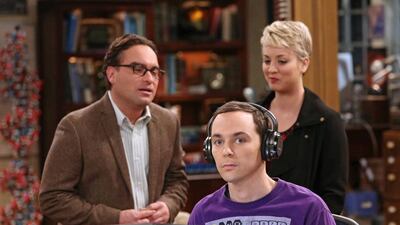I was once working on an episode of a popular American television comedy series, and I had a problem. The scene we were rehearsing was working well, but we didn’t have a good way to finish it.
The slang term for this is "button" – as in something to button-up the scene; a piece of dialogue or action that makes the moment seem complete. Comedies, unlike dramas, need a piece of witty dialogue to transition from one scene to the next – or, in the case of sitcoms that take place in communal areas (the coffee shop in Friends, for instance; or the living room in The Big Bang Theory), they need funny moments to cover the entrance or exit of a character.
“We need a laugh to cover the cross” is something we say in the television comedy business, because we know that watching someone walk across the set is boring. But laughing while someone walks across the set covers the monotony of the movement.
“Don’t talk on the move” is another rule of comedy which means, essentially, if the line is going to get a laugh, make sure you stop, say the line, get the laugh and then continue moving. If you talk and move at the same time, for some reason, it just doesn’t seem as funny.
None of this makes logical sense, of course. Dramas in film and on television routinely just cut away to the next scene, or linger on a character as he or she ambles along, spouting dramatic dialogue. Characters in dramas – and people in real life – are perfectly comfortable entering and departing rooms without first thinking of something funny to say as they walk in or out. Comedy is more demanding than either drama or real life. Every scene needs a button; every cross needs a laugh.
During the rehearsal of that troublesome scene years ago, I learnt another lesson about comedy. We knew we needed a line of dialogue to button the scene, but before I could suggest one, the lead actress in the project – and the principal player in the scene – waved me away. “I got it,” she said. “We don’t need a line.”
And she proceeded to play the scene until the time came for her exit, at which point she stood by the door, delivered her last line, popped a sweet in her mouth – I think it was a mint, or possibly a liquorice drop – and walked out.
It was a funny button to the scene. For some reason, the way she did it made us all laugh. And a few days later, when the audience was watching and the cameras were rolling, we all laughed again.
Some people, in other words, are funny. They just are. They know how to say things a certain way, with a certain look, to make us laugh. They can pop a mint into their mouth at just the right tempo and with a precisely calibrated glance, and we’re laughing and the exit is covered. They have an instinct about what makes us laugh.
These people are called comedians or comic actors and the terms used almost always carry a slight pejorative to them. When you think of funny actors on screen – old favourites such as Dudley Moore or Peter Sellers or more recent stars such as Will Ferrell or Seth Rogen – it’s hard to picture them standing at the podium, accepting an Oscar for their work.
Audiences may love a comedy, but they don’t fully respect one. When it comes time to honour an actor – or, for that matter, a film or television series – the highest accolades almost always go to the serious drama, or to the actor who portrays a solid, humourless hero.
That’s a grave injustice. There’s not a director or screenwriter around who doesn’t trust this basic axiom of show business: an actor who can do comedy can do drama, but it doesn’t work the other way around.
Dramatic actors tend to need reasons to do or say something. They tie themselves up in knots looking for “motivation” and “character truth” and a lot of other silly-sounding catchphrases. If you tell a dramatic actor not to talk on the move or give him or her a joke to cover the cross, they’ll look at you with withering contempt. But a comic actor knows these things instinctively. A comic actor knows how to pop a piece of liquorice into her mouth and exit to exploding laughter.
The title character of Shakespeare's Othello, for instance, is the least funny – and least interesting – character in the play. The real star of Othello, as everyone who has read it knows, is Iago. He has the funniest lines, the cleverest speeches, the most darkly comic dialogue of the play. And it's why – as every actor who has ever played Othello can tell you – it's Iago who gets the most thunderous applause at the curtain call.
But, still, the play is called Othello. Which doesn't seem fair.
Rob Long is a writer and producer in Los Angeles
On Twitter: @rcbl

